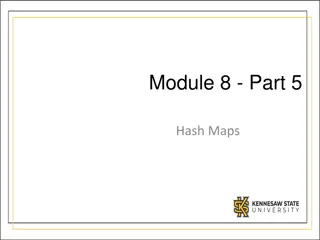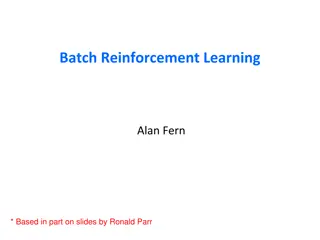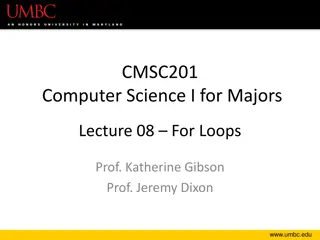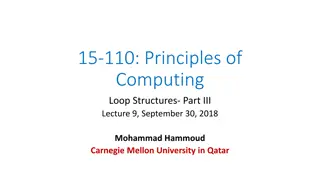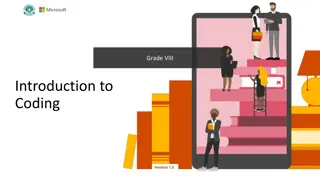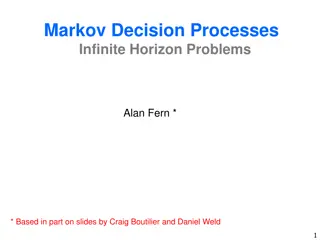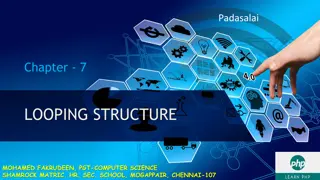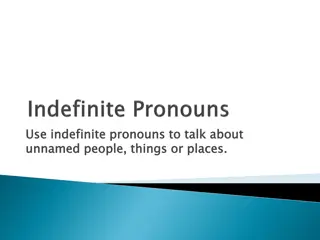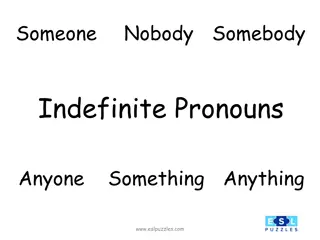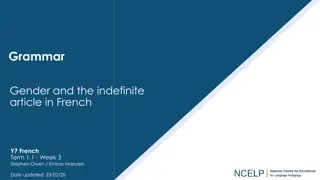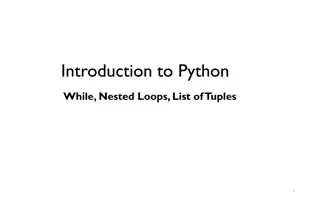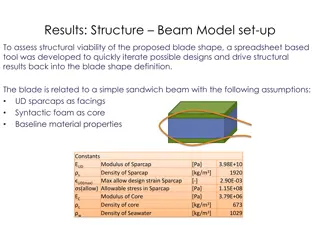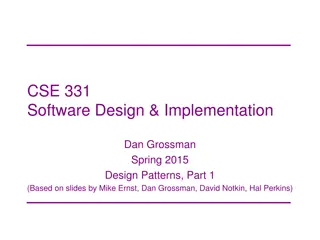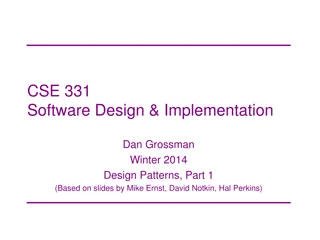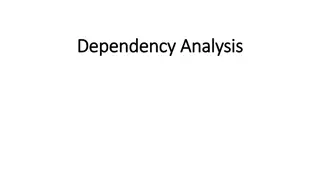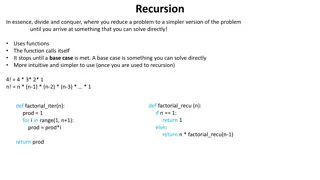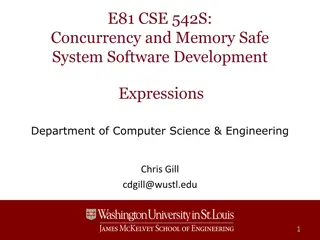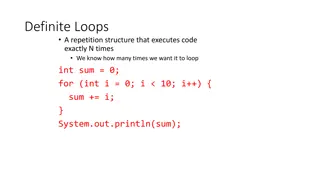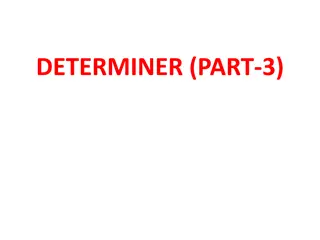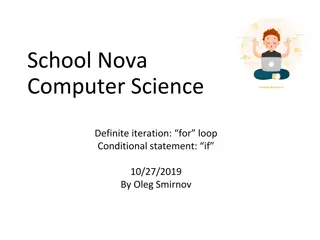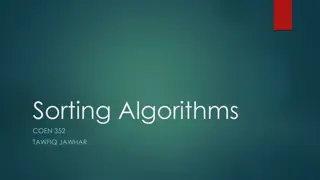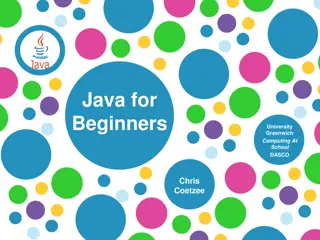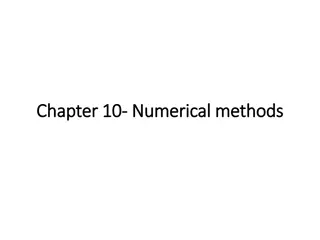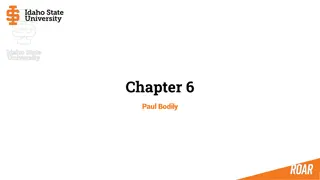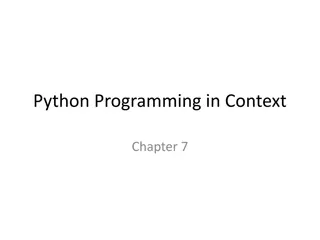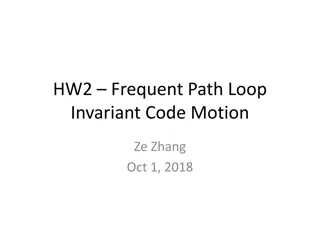Understanding Hash Maps: A Common Data Structure
In this module, learn about Hash Maps, a common data structure used in various programming languages like Java, C#, C++, Python, and PHP. Hash Maps allow you to store key-value pairs without duplicate keys, making it efficient for mapping relationships between data elements. Explore how to declare,
6 views • 16 slides
Helical IT Solutions Unveils Helical Insight 5.2 (2)
Helical IT Solutions proudly announces the launch of Helical Insight version 5.2, the latest iteration of its acclaimed Open Source Business Intelligence (BI) platform. This release marks a significant milestone in empowering enterprises with a versatile and cost-effective BI solution, poised to rev
1 views • 2 slides
Batch Reinforcement Learning: Overview and Applications
Batch reinforcement learning decouples data collection and optimization, making it data-efficient and stable. It is contrasted with online reinforcement learning, highlighting the benefits of using a fixed set of experience to optimize policies. Applications of batch RL include medical treatment opt
2 views • 47 slides
Understanding Roots of Equations in Engineering: Methods and Techniques
Roots of equations are values of x where f(x) = 0. This chapter explores various techniques to find roots, such as graphical methods, bisection method, false position method, fixed-point iteration, Newton-Raphson method, and secant method. Graphical techniques provide rough estimates, while numerica
0 views • 13 slides
Understanding For Loops in Python: A Comprehensive Overview
This content delves into for loops in Python, covering their syntax, practical applications, and differences from while loops. It explores how for loops can iterate over lists and perform actions a set number of times. Learn about the range() function and updating programs using for loops. Additiona
0 views • 47 slides
Understanding Loop Structures in Python Programming
This lecture covers Loop Structures, specifically focusing on the while statement and nested loops in Python programming. It discusses the Fibonacci sequence and demonstrates how to write a program to compute the nth Fibonacci number. Additionally, it explains the difference between definite and ind
3 views • 22 slides
Understanding Completing Sentences in English Grammar for Classes 9-10
Delve into the concept of completing sentences with Assistant Teacher Z.M. Akhtarul Kabir from Wazuddin High School. Learn the definition, rules, and examples of completing sentences with various tenses like present indefinite, past indefinite, and past perfect. Enhance your grammar skills and abili
0 views • 17 slides
Insights on Future Wireless Standards Development
Delve into the progression of IEEE 802.11 standards with a focus on the transition from 802.11be to the next generation. Discussions revolve around the evolution of PHY/MAC task groups, motivations for the new generation, and potential enhancements in system efficiency, latency, throughput, and spec
0 views • 8 slides
Introduction to Coding Ethics and Control Structures
Explore the fundamental concepts of coding ethics, including respect for privacy and confidentiality. Dive into control structures in programming, such as conditionals, logical operators, and relational operators. Gain insights into different types of control structures like sequential, selection/co
0 views • 44 slides
Evolution of Bicycle Designs Over the Centuries
Explore the fascinating evolution of bicycles from the early "Walking Machine" and "Bone Shaker" to the iconic "Penny Farthing" and the revolutionary "Safety Bicycle". Witness the transition from uncomfortable and impractical designs to the safer and more efficient models that laid the foundation fo
1 views • 8 slides
Understanding Item-Based vs Index-Based Iteration in Programming
Exploring the differences between item-based and index-based iteration methods in programming, this content delves into the syntax, readability, and when to use each approach. It provides examples and scenarios to illustrate the use of these iteration methods and discusses the accumulator pattern an
0 views • 17 slides
Understanding Infinite Horizon Markov Decision Processes
In the realm of Markov Decision Processes (MDPs), tackling infinite horizon problems involves defining value functions, introducing discount factors, and guaranteeing the existence of optimal policies. Computational challenges like policy evaluation and optimization are addressed through algorithms
2 views • 39 slides
Introduction to Markov Decision Processes and Optimal Policies
Explore the world of Markov Decision Processes (MDPs) and optimal policies in Machine Learning. Uncover the concepts of states, actions, transition functions, rewards, and policies. Learn about the significance of Markov property in MDPs, Andrey Markov's contribution, and how to find optimal policie
0 views • 59 slides
Understanding Looping Structures in PHP
Looping structures are essential in programming for writing iteration logics. This article delves into the importance of looping structures, different types in PHP, and creating basic logic using loops like for, while, for each, and do-while. Learn the syntax, parameters, examples, and flow charts t
0 views • 23 slides
Understanding Indefinite Pronouns: A Tale of Everybody, Somebody, Anybody, and Nobody
This story highlights the importance of recognizing indefinite pronouns such as everybody, somebody, anybody, and nobody. Through the tale of four individuals and a task left undone, the narrative emphasizes the roles of common, singular, and plural indefinite pronouns in subject-verb agreement. Exp
0 views • 11 slides
Understanding Indefinite Pronouns in English
In English grammar, indefinite pronouns are used to refer to unnamed people, things, or places. They can be affirmative, negative, or used in questions. Examples like "some," "any," and their variations are common in everyday conversations. Learn how to use them correctly to convey the intended mean
0 views • 8 slides
Practice Indefinite Pronouns with ESL Puzzles
Enhance your understanding of indefinite pronouns like someone, nobody, anybody, and everybody with these engaging ESL puzzles. Test your knowledge in various scenarios and improve your English skills effortlessly. Discover new ways to use indefinite pronouns in sentences and boost your confidence i
0 views • 12 slides
Gender and the Indefinite Article in French
In French, nouns have genders (masculine or feminine) and are accompanied by definite articles (un or une) based on their gender. Learning the gender of nouns is essential as it cannot be guessed from the meaning or appearance. The indefinite article "a" is represented by un for masculine nouns and
0 views • 12 slides
Understanding Python Loops: While, Nested Loops, and List of Tuples
Python loops come in two types - definite loops (like for loops) and indefinite loops (like while loops). While loops are used for conditional iteration, repeating as long as a condition is true. On the other hand, for loops are ideal for situations where the number of iterations is known in advance
0 views • 25 slides
Structural Assessment and Blade Design Iteration Tool Development
A spreadsheet tool was created to assess the structural viability of a proposed blade shape, incorporating a sandwich beam model with UD sparcaps and syntactic foam core. Validation of the beam model against FEA results was conducted, highlighting the relationship between beam thickness, spar width,
0 views • 10 slides
Introduction to Software Design Patterns in CSE 331 Spring 2015
Dive into the world of design patterns with a focus on creational patterns, structural patterns, and behavioral patterns in the context of software design and implementation. Explore concepts like encapsulation, subclassing, and iteration along with their problems, solutions, advantages, and disadva
0 views • 48 slides
Understanding Software Design Patterns in CSE 331 Winter 2014
Explore the concept of design patterns in software development, including creational, structural, and behavioral patterns. Learn about encapsulation, subclassing, and iteration with examples and their solutions and disadvantages.
0 views • 46 slides
Understanding Singular and Plural Indefinite Pronouns
Explore the difference between singular and plural indefinite pronouns with examples. Learn about singular indefinite pronouns like 'each' and 'nobody', plural ones such as 'several' and 'few', and those that can be both singular and plural like 'some' and 'all'.
0 views • 5 slides
Understanding Data Dependencies in Nested Loops
Studying data dependencies in nested loops is crucial for optimizing code performance. The analysis involves assessing dependencies across loop iterations, iteration numbers, iteration vectors, and loop nests. Dependencies in loop nests are determined by iteration vectors, memory accesses, and write
0 views • 15 slides
Mastering Definite and Indefinite Articles in English Grammar
Delve into the intricacies of definite and indefinite articles in English grammar through understanding their usage with examples and pretests. Learn how native speakers employ articles to convey particularity or generality before nouns, differentiate between specific and nonspecific items, and gras
0 views • 14 slides
Understanding Recursion in Computer Science
Recursion is a powerful concept in computer science that involves breaking down a problem into smaller, more manageable parts until a base case is reached and solved directly. By utilizing functions that call themselves, recursion offers an elegant way to solve complex problems. This post delves int
0 views • 13 slides
Understanding Rust Expressions and Declarations in System Software Development
Rust is an expression language where most things have values. Learn about Rust expressions, blocks, declarations, conditional expressions, multi-case expressions, and iteration expressions in system software development. Explore the execution semantics, syntax, and best practices for writing safe an
0 views • 8 slides
Explore Definite Loops in Java
Dive into the world of definite loops in Java, understanding their structure and behavior through practical examples. Learn about for loops, loop initialization, conditions, incrementing, and common pitfalls to avoid. Discover the concept of looping to execute code a specific number of times and enh
0 views • 11 slides
Understanding the Use of Articles: Indefinite and Definite Determiners
Explore the uses of indefinite determiners (articles "a" and "an") in different contexts such as introducing nouns, expressing quantities, class examples, and more. Learn important rules regarding their usage, including when to use "a" and "an" before nouns and adjectives. Additionally, discover the
0 views • 13 slides
Understanding Definite Iteration in Computer Science
Definite iteration in computer science involves using for loops and conditional statements to execute a set of instructions a specific number of times. This concept is demonstrated through examples and exercises such as iterating through a range of numbers, calculating sums and products, and underst
0 views • 11 slides
Understanding Bubble Sort Algorithm - COEN 352 by Tawfiq Jawhar
Dive into the world of sorting algorithms with a focus on Bubble Sort. Explore how Bubble Sort works through animations, visual representations, and explanations of its time complexity, stability, and in-place nature. Discover the significance of one iteration in Bubble Sort and how it affects the a
0 views • 17 slides
Learning the Basics of Java Programming through Visual Guides
Explore the fundamentals of Java programming step by step with visual aids covering syntax, variables, loops, logic operators, iteration, and more. Understand essential concepts such as conditional statements, iteration types, and logic checks in Java.
0 views • 22 slides
ECURE: Course-based Undergraduate Research Experiences Framework
ECURE is an initiative funded by the National Science Foundation, aimed at enhancing undergraduate STEM education through Expanded Course-based Undergraduate Research Experiences. The framework includes essential elements of authentic research, emphasizing collaboration, iteration, and discovery. De
0 views • 17 slides
Exploring the Power of Recursion in Programming
Understanding recursion is essential for solving complex problems efficiently in programming. Recursion involves breaking down a big problem into smaller instances of the same problem, leading to elegant and concise code. By learning recursion, programmers gain a different perspective on problem-sol
0 views • 36 slides
Understanding Numerical Methods for Root Finding and Iteration
Explore the concepts of root finding, locating roots, stationary points, and iteration in numerical methods. Learn to determine roots, stationary points, and convergence/divergence types, as well as apply the Newton-Raphson method for function approximation.
0 views • 17 slides
Understanding Numerical Methods in Mathematics
Explore the world of numerical methods in mathematics, focusing on the Newton-Raphson Method and root approximations. Discover how to locate roots of equations and use iteration to enhance your problem-solving skills. Uncover the significance of numerical methods in finding solutions to complex equa
0 views • 28 slides
Understanding Indefinite Pronouns in English
Indefinite pronouns in English express the ideas of all, any, none, or some. Examples include all, everybody, anyone, nobody, something, somewhere, and more. Learn how to use indefinite pronouns correctly in sentences to convey different meanings and concepts.
0 views • 16 slides
Enhancing Programming Skills: Iteration and Problem Solving in CS Course
Central concepts of iteration and problem-solving techniques in a Computer Science course are explored and valued by students in Chapter 6. Feedback highlights the effectiveness of TA support, engaging teaching methods, and practical exercises. Suggestions for improvement include better alignment of
0 views • 12 slides
Understanding Python Data Mining and Cluster Analysis in Context
This chapter delves into using Python lists for data storage, implementing data mining applications, and exploring cluster analysis. Learn about clusters, centroids, Euclidean distance, visualization, and how to write functions for data analysis. The concepts of indefinite iteration and loop control
0 views • 27 slides
Loop Invariant Code Motion (LICM) in LLVM
Loop Invariant Code Motion (LICM) is a technique used in LLVM to move operations that do not change within a loop outside of the loop, improving performance by executing them only once per loop iteration. This process must be done carefully to handle memory operations and operations that are not exe
0 views • 19 slides
